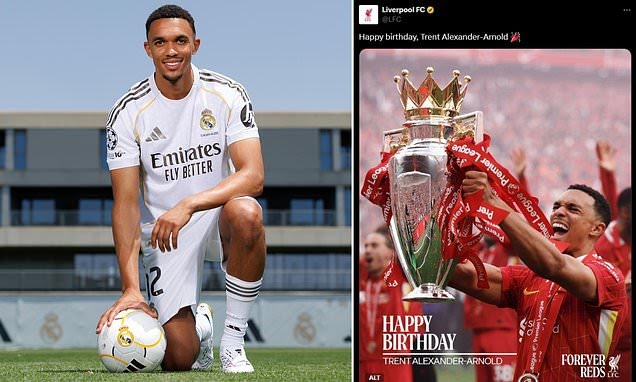Liverpool fans hit out at club’s Trent Alexander-Arnold tweet THREE MONTHS after former star’s acrimonious Anfield exit

It was supposed to be a simple birthday message. Just a few words on social media to celebrate one of Liverpool’s greatest ever right-backs. But what started as a normal post turned into a storm that shook the club again, reopening old wounds that had barely healed since the day Trent Alexander-Arnold walked out of Anfield for the last time. On a quiet Tuesday morning, Liverpool’s official account posted a photo of Trent holding the Premier League trophy, smiling the way he used to when everything was right in his world. The caption read: “Happy Birthday, Trent Alexander-Arnold.” Just that. But within minutes, chaos followed.
For many Liverpool fans, the post was like a punch to the heart. Some couldn’t believe the club dared to celebrate a player they still called a traitor. Others saw it as a painful reminder of what had been lost — not just a player, but a symbol of the club’s soul. Trent was not just anyone. He was the boy from West Derby, the kid who grew up dreaming of walking through the Shankly Gates, the academy graduate who turned into a world-class defender and lifted Liverpool to heights they hadn’t seen in decades. He was the local hero who made them believe in the dream again.
But all of that had ended three months earlier, when Trent made the most shocking move of his career — leaving Liverpool for Real Madrid on a free transfer. The manner of his exit hurt more than the move itself. He didn’t take the club’s renewal offer. He didn’t wait for a farewell. He walked away quietly, letting his contract run down, and joined the very club that had broken Liverpool hearts in two Champions League finals. To many supporters, it wasn’t just a transfer; it was betrayal.
The bitterness didn’t fade with time. In fact, it grew. Each passing week without Trent’s name in the squad, each shaky defensive display from Liverpool under Arne Slot, each reminder of how much the team missed his passing and creativity — all of it added to the pain. So when the club posted that birthday message, it felt to some like salt on an open wound.
The comment section exploded within minutes. One fan wrote angrily, “Lads we’ve just lost three on the bounce, could you not?” Another added, “This tweet is worse than those three straight defeats.” Others were even more brutal: “We are NOT wishing him a happy birthday,” one declared, while another called Trent a “rat” and a “traitor.” The emotion behind those words came from deep scars — scars left by a player who once felt like one of them.
But not everyone agreed with the hate. Some fans chose kindness, remembering the good times. One supporter replied, “Happy birthday to the smoothest passer of the ball. Trent could ping a ball like nobody else.” Another added, “Happy birthday to Trent. He’s suffered enough in Madrid, I actually feel for him now.” And then came the voice of reason from a fan tired of the fighting: “As an honest Liverpool fan, I have to say we have the worst fanbase on earth. Trent is arguably our biggest club legend, someone who gave everything for the club, and this is how we repay him?”
For Trent himself, somewhere in Madrid, it must have been a strange day. He had celebrated birthdays in Liverpool for years — surrounded by teammates, loved by fans, adored by the city that raised him. But this year was different. This year he was far away, wearing white instead of red, hearing Spanish instead of Scouse, and knowing that his name — once sung with pride — now carried anger and disappointment. He had made a decision that changed everything, and the reality of that choice was beginning to sink in.
Reports from Spain suggested that Trent had struggled to settle. He was no longer the automatic starter he used to be at Liverpool. Real Madrid’s fans respected his talent but were not easy to please. The expectations were sky-high, and the pressure even higher. Every misplaced pass, every defensive error, every moment he looked uncertain — it was all magnified. There were whispers that he missed home, missed Anfield, missed that special connection he had with the crowd.
And soon, fate was preparing the cruelest twist of all: a return to Anfield. On November 4th, Real Madrid would play Liverpool in the Champions League. For the first time since his departure, Trent Alexander-Arnold would walk out onto the Anfield pitch wearing the badge of their greatest rival. The fixture was already one of the most anticipated of the season, but now it carried a story so personal that every camera, every chant, every heart would be focused on one man.
Steve McManaman, another player who once made the same move from Liverpool to Madrid decades earlier, spoke about it in September. “Trent going back to Anfield, it was always going to happen,” he said. “It’s going to be emotional for him, hard for him, because in the end, the crowd will give him a good reception. But they will also want Liverpool to win.” His words were kind, but many knew the reality might not be so simple. The wounds were still fresh. The fans were still divided. Some wanted to forgive; others wanted to make sure he knew the pain he caused.
In Liverpool, people still talked about him like they knew him personally. Taxi drivers, pub regulars, school kids — everyone had an opinion about Trent. Some said he was right to chase a new challenge. Others said loyalty meant more than money or trophies. But deep down, even the angriest fans missed him. They missed the long diagonal passes that split defenses apart, the calm swagger he brought to the game, the way he lifted his arm before every corner kick as if signaling magic was about to happen. They missed the pride of having one of their own leading the team.
Under Arne Slot, Liverpool had struggled to fill the void. Connor Bradley was talented and hardworking, but he wasn’t Trent. The chemistry between Trent and Mohamed Salah had been something special — a connection built over years of trust and understanding. Since his departure, Salah looked isolated, often frustrated, and his form had dropped. Even Wayne Rooney recently mentioned that Trent’s absence had hurt Salah more than anyone else. “Some of the passes Trent played through to Salah, that’s a big loss for Liverpool,” Rooney said. It was true — without Trent’s creative influence from the back, Liverpool looked like a team missing its rhythm.
In Madrid, Trent tried to stay focused. He was working hard, learning Spanish, adapting to a new system. But the media in Spain was relentless. Every time Liverpool played, every time Arne Slot’s team dropped points, questions came his way. “Do you regret leaving?” “Would you ever go back?” He never answered directly. He just smiled, said he respected Liverpool, and talked about focusing on the future. But behind that smile, there was a flicker of emotion — something only those close to him could see.
The upcoming trip to Anfield brought all those feelings back. His agent had told him to expect boos, maybe even banners against him. He said it was part of football. But Trent knew Anfield. He knew that stadium breathed emotion. He had been there when it roared in joy, and he had been there when it fell silent in heartbreak. Walking back there as an opponent would be like walking into a dream turned nightmare.
Liverpool’s social media team didn’t mean to cause drama with that birthday post. It was standard practice — they did it for every player, past or present. But in this case, they underestimated the depth of feeling still surrounding Trent’s departure. For many fans, seeing his face again reminded them of what could have been. If he had stayed, maybe Liverpool wouldn’t be struggling now. Maybe Salah would still be scoring freely. Maybe Arne Slot’s job would be easier. Maybe the club would still feel whole.
For some fans, the reaction was simply about timing. “We’ve lost three games in a row, and this is what you post?” one fan complained. It wasn’t just about Trent; it was about the pain of seeing their club in trouble again and being reminded of one of the biggest losses in recent memory.
But amid the noise and anger, there were quiet voices of gratitude. Older fans remembered the boy who had once played in the Champions League final at just 19 years old. They remembered the free-kick against Chelsea, the corner taken quickly against Barcelona, the leadership he showed at such a young age. They remembered that without Trent, some of Liverpool’s greatest modern nights might never have happened.
Time has a strange way of changing how people feel. One day, maybe the boos will fade. Maybe the chants of anger will turn into applause again. Maybe when he retires, Trent Alexander-Arnold will be welcomed back as the local hero he once was, forgiven for the decision that broke so many hearts. But for now, the story remains painful — a story of love, loyalty, ambition, and regret.
As the Anfield fixture approaches, all eyes are on that reunion. Will the fans forgive? Will Trent look back up at the Kop, see the banners, and remember what he lost? Or will he stand tall in white, proving to himself that leaving was worth it? No one truly knows.
But one thing is certain — when the lights shine on Anfield that night, when the music of the Champions League echoes through the stands, when Trent steps onto the pitch, he will feel the weight of every memory, every cheer, every tear that place ever gave him. He will feel the love that once lifted him and the anger that now follows him. He will face the city that made him, and for a few emotional moments, Liverpool and Trent Alexander-Arnold will come face to face again — not as one, but as two sides of a story that football will never forget.















